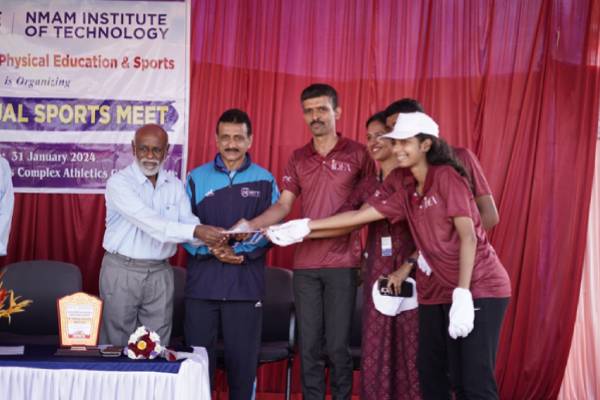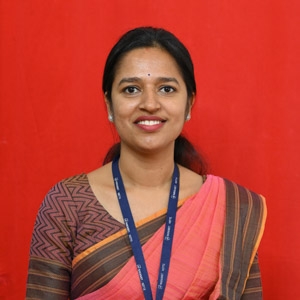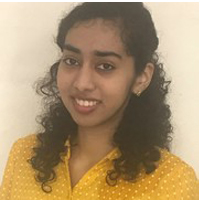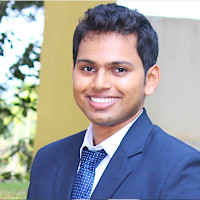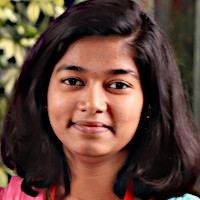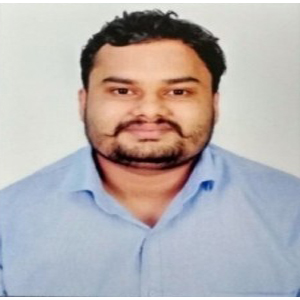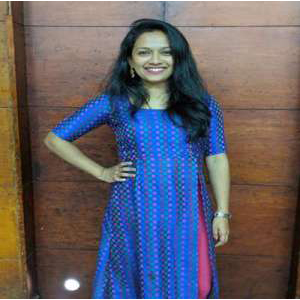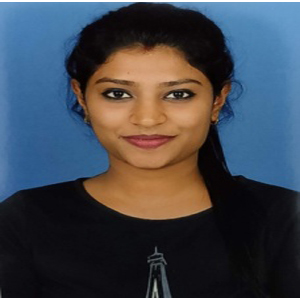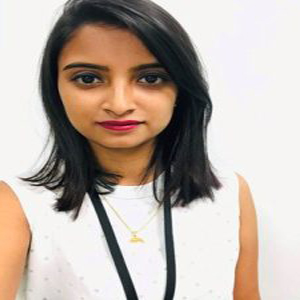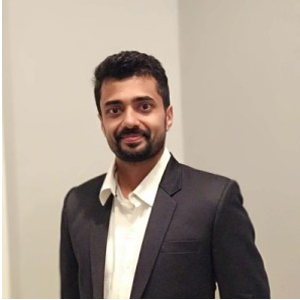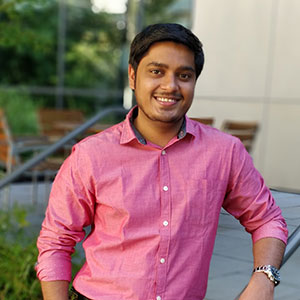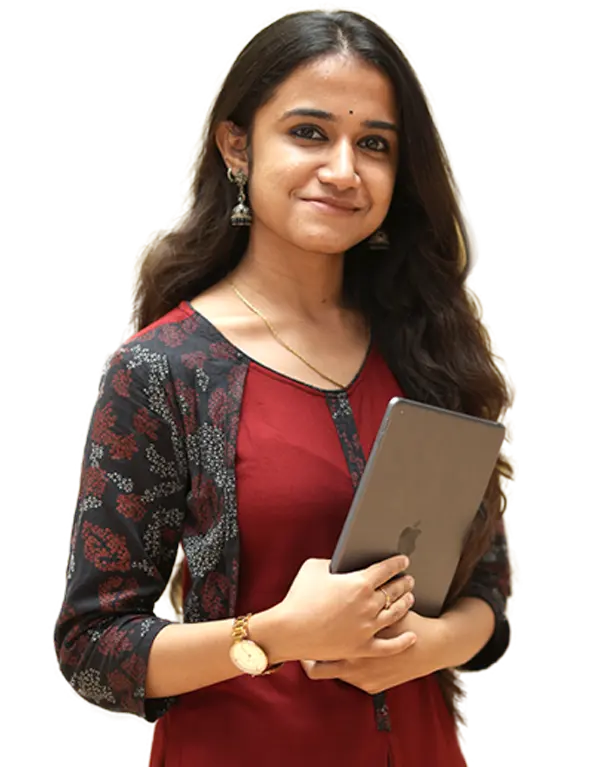
Bachelor of Technology in Artificial Intelligence and Data Science (AI & DS), is an engineering program started in the academic year 2022–23 under Nitte Deemed to be University, aiming to create experts in the domain of data science. It enables the students to acquire technical skills to perform data processing, analysis and visualization in real-time applications from various domains. The courses studied in this program relate with methodologies, processes, techniques and tools drawn from various domains of computing and information science to extract knowledge from structured and unstructured data.
The concepts studied in AI & DS cover the applications of mathematical concepts for data handling, study of various methods followed for data handling and analysis, applications of data analysis in the domain of artificial intelligence.
The knowledge acquired could be applied in designing the software systems facilitating intelligent decisions in business applications. It is a specialized branch that deals with the development of data-driven solutions, data visualization tools and techniques to analyze big data. It also incorporates the concepts of machine learning and deep learning model building for solving various computational and real-world problems.
Vision
Achieving excellence in engineering education by creating a dynamic learning environment, fostering collaboration and interdisciplinary research in Artificial Intelligence and Data science, and empowering our graduates to become leaders in the global AI landscape.
Mission
- Creating an ecosystem of academic excellence by incorporating the best possible teaching-learning methodology, collaborative research and usage of modern IT infrastructure and tools.
- Grooming professionals with ethical values and inculcate the ability to solve real-life problems that involves data analytics.
- Contributing to the innovation of computing, AI system and Data Science to raise satisfaction level of all stakeholders.
- Preparing professionals for employment in industry, research, higher education, community partnerships, and entrepreneurship to benefit the society.
- To have a successful professional career with capabilities to build innovative solutions by applying the knowledge of Data Science and using technology as a tool to solve real-world problems.
- To develop an ethical attitude and exhibit effective skills in communication, management, teamwork, and leadership to lead and work as a team in a professional environment.
- To develop engineering, problem-solving, and critical thinking skills to create social, economic and sustainable impact and develop an ability to adapt themselves to the dynamically changing technologies catering to the organizational needs.
Engineering Graduates will be able to
- PO1: Engineering knowledge: Apply the knowledge of mathematics, science, engineering fundamentals, and an engineering specialization to the solution of complex engineering problems.
- PO2: Problem analysis: Identify, formulate, review research literature, and analyze complex engineering problems reaching substantiated conclusions using first principles of mathematics, natural sciences, and engineering sciences.
- PO3: Design/development of solutions: Design solutions for complex engineering problems and design system components or processes that meet the specified needs with appropriate consideration for the public health and safety, and the cultural, societal, and environmental considerations.
- PO4: Conduct investigations of complex problems: Use research-based knowledge and research methods including design of experiments, analysis and interpretation of data, and synthesis of the information to provide valid conclusions.
- PO5: Modern tool usage: Create, select, and apply appropriate techniques, resources, and modern engineering and IT tools including prediction and modeling to complex engineering activities with an understanding of the limitations.
- PO6: The engineer and society: Apply reasoning informed by the contextual knowledge to assess societal, health, safety, legal and cultural issues, and the consequent responsibilities relevant to the professional engineering practice.
- PO7: Environment and sustainability: Understand the impact of the professional engineering solutions in societal and environmental contexts, and demonstrate the knowledge of, and need for sustainable development.
- PO8: Ethics: Apply ethical principles and commit to professional ethics and responsibilities and norms of the engineering practice.
- PO9: Individual and team work: Function effectively as an individual, and as a member or leader in diverse teams, and in multidisciplinary settings.
- PO10: Communication: Communicate effectively on complex engineering activities with the engineering community and with society at large, such as, being able to comprehend and write effective reports and design documentation, make effective presentations, and give and receive clear instructions.
- PO11: Project management and finance: Demonstrate knowledge and understanding of the engineering and management principles and apply these to one’s own work, as a member and leader in a team, to manage projects and in multidisciplinary environments.
- PO12: Life-long learning: Recognize the need for, and have the preparation and ability to engage in independent and life-long learning in the broadest context of technological change.
- Apply the principles of artificial intelligence and data science to develop the systems that require data analysis, inference, perception, knowledge representation, and learning.
- Obtain the competencies to excel in Employment, Higher studies and Research in Artificial Intelligence and Data Science while upholding ethical values.
- Demonstrate proficient professional abilities for seamless collaboration within diverse and interdisciplinary teams, embracing a growth-oriented mindset.
For any information regarding the admissions,mail us at: info@nitte.edu.in

Faculty
Program
- Duration - 4 years
- Semester - 08
- Intake - 60 Students
Department Activities
Date: 16 October, 2023
Venue: Nandini Seminar hall, NMAMIT, Nitte
Resource Person:
Mr. Murali S Iyer, Professor of Practice, Department of AI & DS, NMAMIT, Nitte, Former partner, Wipfli
Aim of the workshop: The workshop was designed to give some insight into the applications of software engineering practice during the course of study as a part of mini projects. The faculty are given with inputs on how to incorporate the software engineering practices in the curriculum.
Contents of the workshop: Resource person, Mr. Murali Iyer explained the observations of students not being able to apply the concepts of software engineering to the software projects that they carried out. During the session, Mr. Iyer explained the industry practices of using Software Engineering process while developing the software products. Various processes like waterfall, spiral, incrimetal models of software engineering were discussed during the session.
A major part of the session was dedicated to discussing the Agile methodology. The speaker elaborated on its iterative approach, adaptability, and its relevance in modern project management.
Faculty are encouraged to evaluate the mini projects and final year projects by keeping the rubrics as per the software engineering life cycle.
Total 14 faculty members from various departments participated in the workshop. The Principal Dr. Niranjan N Chiplunkar addressed the faculty members and highlighted the need for integration of practicing software engineering during student projects Mr. Bharath G Kumar, Head of Placement and Training department mentioned the observations made by various companies regrading the skill sets of the graduate students. From these observations it was suggested to include more problem solving and real life case studies during the teaching process. Probelms from the website like HackerEarth and HackerRank are to be discussed in the class and added in the examination papers.
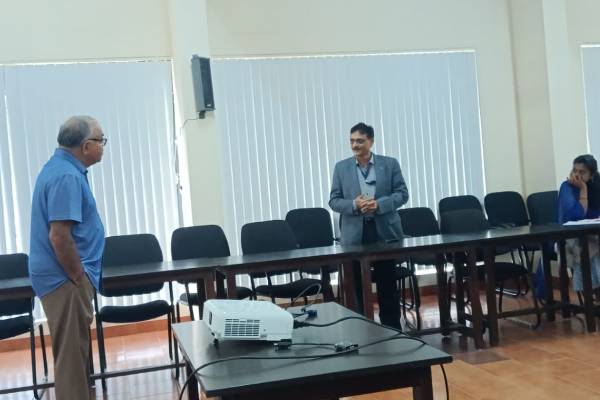
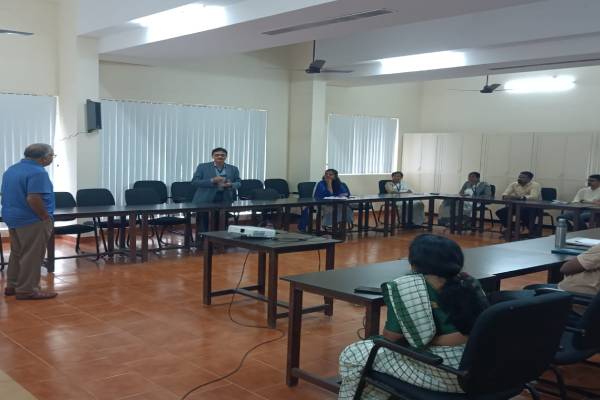
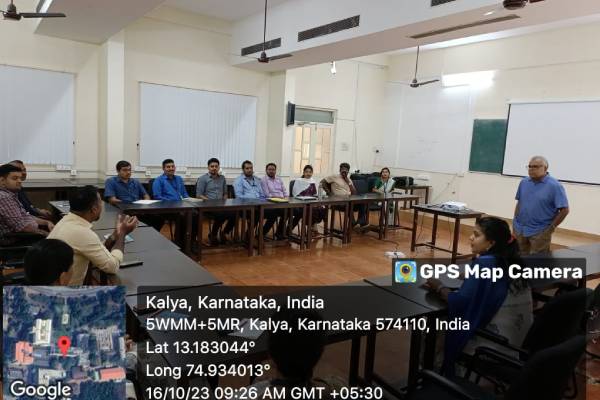
An interaction program with Mr. Piyush Goel, a former senior vice president of Capillary Technologies, was organized on 11 September 2023, from 2 to 3:30 p.m. at Shambhavi Seminar Hall, for the students in the Department of Artificial Intelligence and Data Science.
During the interactive event, Mr. Piyush Goel discussed the multiple obligations of a data science engineer from the aspect of the job, as well as the necessary preparations for such responsibilities. He quoted several case studies indicating the engineering concepts applied to the data analytics projects. When asked about the significance of foundational subjects in computer science, such as algorithms, computer networks, computer organization, and data structures, he responded by emphasizing the significance of a data engineer who should have the foundations of core subjects as a basic requirement to excel in any information technology field. In addition, the necessity of core computer science subjects in the curriculum cannot be overstated. These subjects provide a strong foundation for students to understand fundamental concepts and principles in computer science. These are essential for building a successful career in the field. Likewise, core computer science subjects help develop critical thinking and problem-solving skills that are applicable in various domains beyond just programming. He also gave some insights into how data may be acquired from our own devices and explained the pros and cons of doing so.
Additionally, he strongly suggested that students sign up for an account on GitHub or other open-source site so that they may share their work and cooperate with other programmers. Engaging actively in open-source projects allows individuals to get important experience and receive feedback from the community, thereby developing their abilities and expertise in machine learning. This may be accomplished by actively engaging in the project. In addition to that, he underlined how important it is to always learn new things and to have an inquisitive attitude about new techniques and technologies to remain competitive in this quickly developing profession.
Furthermore, he discussed recent developments in data science and how those developments are transforming a variety of business sectors. He also emphasized the students to have a hands-on experience with real-world datasets through projects or internships to showcase your practical skills and problem-solving abilities.
Students actively participated in the session by clarifying their queries about the data science project development and industry expectations. The session had helped the students to plan their study process during their engineering course. Ms. Abhijna and Ms. Nidhi Shenoy presented their painting to Mr. Goel as a memento.



Session Date: August 7, 2023 - August 11, 2023
Session Speakers:
Mr. Murali S Iyer, Professor of Practice, Department of AI & DS, NMAMIT, Nitte, Former partner, Wipfli
Mr. Sumanth Padival, Director and Head of India Operation, Wipfli India
Mr. Rajesh Suryanarayan, Business Analysst, Wipfli India
Mr. Pradhan Iyer, Custom Software Manager, Wipfli India
Mr. Raveesha, Head of Talent and Culture, Wipfli India
Branches (7th semester):
- Artificial Intelligence and Machine Learning
- Computer and Communication Engineering
- Computer Science and Engineering
- Electronics and Communications
- Information Science and Engineering
Session Report: Team from Wipfli Inida had conducted sessions for the final year students to enable them for the placements. During the session, the speakers addressed the following key points.
Team Building: The session emphasized the significance of team dynamics and how to build strong working relationships among team members. Mr. Murali S Iyer highlighted the importance of understanding individual strengths and weaknesses to create a harmonious and efficient team.
Curiosity on the Project: Mr. Sumanth Padival discussed the role of curiosity in driving successful project outcomes. He encouraged participants to cultivate a curious mindset, fostering innovation and deeper problem-solving. Self-Accountability: Mr. Rajesh Suryanarayan focused on personal responsibility within a team setting. He underscored how individual accountability contributes to the collective success of the team and the project as a whole.
Teamwork: Mr. Pradhan Iyer explored the intricacies of effective teamwork, including active listening, conflict resolution, and leveraging diverse skills to achieve common goals.
Communication: Mr. Raveesha delved into the art of communication within teams. He provided insights on clear and transparent communication, promoting a collaborative and inclusive work environment.
Leadership: Throughout the sessions, the speakers collectively touched upon leadership qualities that empower team members to take initiative, guide others, and navigate challenges confidently.
Agile Methodology: An integral part of the sessions was dedicated to discussing the Agile methodology. The speakers elaborated on its iterative approach, adaptability, and its relevance in modern project management.
In the session, insights were provided by Dr. Venugopala P S, Professor and Head of AI & DS, regarding the current state of teamwork within the project. This encompassed equitable project distribution, student comprehension of project aspects, and the methodology of student collaboration in teamwork.
Mr. Bharath G Kumar, Head, the department of counselling, welfare, training and placement, elaborated on the positive and negative aspects that students may encounter during the placement process.
The above topics were repeated in each sessions, where each batch was consisting of 60 students.
The sessions were organized as per the following time table.
| Date | Time | Branch | Room No. |
|---|---|---|---|
| 07 August 2023 | 11.00AM to 1.00PM | ECE | LH006, S Ramanujan Block |
| 07 August 2023 | 9.00AM to 11.00AM | ECE + AIML | NC 32, SMV Block |
| 08 August 2023 | 9.00AM to 11.00AM | ECE | LH002, S Ramanujan Block |
| 08 August 2023 | 11.00AM to 1.00PM | AIML+ CCM | SMV52, SMV Block |
| 08 August 2023 | 2.00PM to 4.00PM | CSE | LH104, S Ramanujan Block |
| 09 August 2023 | 11.00AM to 1.00PM | ISE | NC 26, SMV Block |
| 09 August 2023 | 11.00AM to 1.00PM | ISE | NC 26, SMV Block |
| 09 August 2023 | 2.00PM to 4.00PM | CSE | LH108, S Ramanujan Block |
| 10 August 2023 | 9.00AM to 11.00AM | CSE + ISE | ELH104, Atal Block |
| 10 August 2023 | 11.00AM to 1.00PM | ECE + ISE | LH112, S Ramanujan Block |
| 11 August 2023 | 9.00AM to 11.00PM | CSE | LH005, S Ramanujan Block |
| 11 August 2023 | 11.00AM to 1.00PM | ISE | ELH001, Atal Block |
The sessions were well-received by participants from various engineering branches, fostering a rich exchange of ideas and experiences. Attendees gained insights into practical techniques for enhancing team dynamics, effective communication, and project management strategies. The comprehensive coverage of topics ranging from individual accountability to larger project frameworks left participants with a well-rounded understanding of successful project execution. Overall, the sessions greatly contributed to the development of valuable skills required for future engineers and leaders in the ever-evolving landscape of technology and engineering.



Date: 02 to 06 July 2024
TThe Faculty Development Program (FDP) on Microsoft Power BI Data Analyst Associate was organized to equip faculty members with advanced data analysis and visualization skills using Microsoft Power BI. The program aimed to enhance their knowledge and proficiency in data-driven decision-making processes, enabling them to teach and guide students in data analytics effectively.
The FDP was conducted by the ICT academy, organized by the Department of Information Science and Engineering and the Department of Artificial Intelligence and Data Science in association with the IEEE student branch, NMAMIT. The program commenced with a welcome address by Dr. Balasubramani R, Professor, Department of ISE. The resource person for the FDP was Mrs. Sumathi, ICT Academy, Bangalore who led the sessions and shared her expertise in Microsoft Power BI.
Day 1: Mrs. Sumathi began the session with the basics of Power BI. She demonstrated the installation of Power BI Desktop and explained the process of importing various types of files, transforming data, creating queries, and other foundational concepts.
Day 2: On the second day, Mrs. Sumathi covered topics such as creating model relationships, configuring table and column properties, creating hierarchies, creating quick measures, and configuring many-to-many relationships.
Day 3: The third day focused on creating calculated tables, calculated columns, and simple measures using Data Analysis Expressions (DAX). Participants also learned to create measures with DAX expressions involving filter context manipulation.
Day 4: The session on the fourth day was dedicated to designing a report, configuring visual fields and format properties, and publishing the report on the Power BI server. Advanced design features were also taught.
Day 5: On the final day, the focus was on creating dashboards, where participants learned to assemble various visualizations and reports into comprehensive dashboards for better data representation and analysis.
Participants provided positive feedback, highlighting the practical approach and hands-on sessions as particularly beneficial. Many expressed increased confidence in using Power BI for data analysis and visualization. The program has contributed to the overall enhancement of academic quality and the promotion of data-driven decision-making within the institution. The success of this FDP underscores the importance of continual professional development in keeping pace with technological advancements in education.

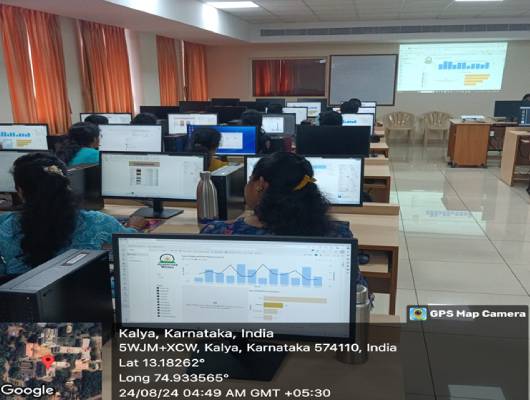
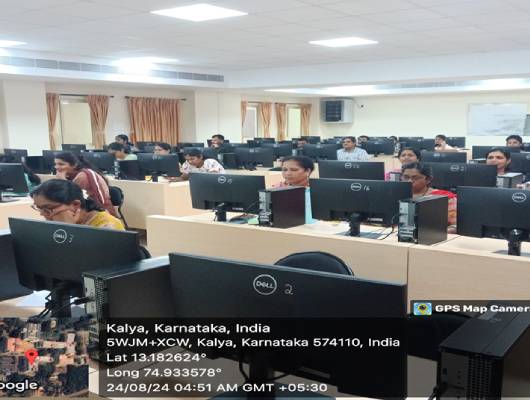
Date: 15 -16 February 2024
The Department of Mechanical Engineering & Department of Artificial Intelligence & Data Science organized a 2 Days Workshop on GENERATIVE AI IN TEACHING, LEARNING AND RESEARCH – CHALLENGES AHEAD on 15 & 16 February, 2024 in association with IQAC and SDC, Nitte DU. The inauguration function was held on 15 February 2024 at 9.30 AM in Phalguni Seminar Hall. Dr. S.Suresh Kumar, CTO, Brain Tower, Oman was the Chief Guest. He inaugurated the workshop by lighting the lamp. In the inaugural address, he highlighted the significance of Generative AI and its vast applications in different domains including in education and. Dr. Niranjan N Chiplunkar, Principal, NMAMIT presided over the function and congratulated the departments for organizing such a workshop. He requested all faculty to attend the Chief guest’s talk to gain some insights into Generative AI. Dr. Srinivasa Pai P, Head, Dept. of Mechanical Engg., Convenor of the workshop welcomed the gathering and briefed about the significance and the schedule of the workshop. Dr. Venugopala P S, Head, Dept. of AI & DS, introduced the Chief Guest. Dr. Vidya S M., IQAC Coordinator of the institute proposed the vote of thanks. Ms. Ankitha Shetty, Faculty department of AI & DS compered the program. About 30 participants participated, which included external participants from nearby colleges. There was a total of 6 technical sessions in the workshop. Dr. Suresh Kumar had conducted two sessions on 15 February. The other sessions were delivered by Dr. Aravinda C. V., Dr. Srinivasa Pai, Dr. Venugopala P. S and Dr. Narendra K C. The workshop has received good feedback from the participants.
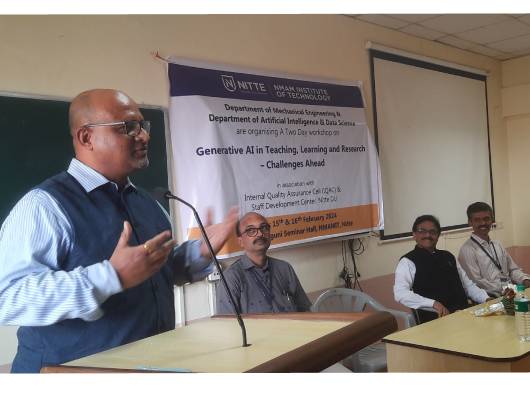
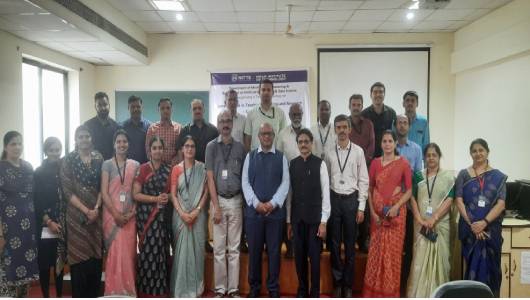
Date: 16 -20 January 2024
A Five-day faculty development program on “Industrial Applications of Artificial Intelligence and Data Science” was organized by the Dept. of Artificial Intelligence & Data Science in association with the Internal Quality Assurance Cell (IQAC) & Staff Development Centre, Nitte DU from 16 to 20 January 2024. The FDP was inaugurated by Mr. Murali Iyer, Former Partner, Wipfli USA. In his inaugural address, Mr. Murali underscored the significance of data analysis from an industrial standpoint, emphasizing the need for incorporating data science into the engineering curriculum. He shared insights from his experience working on projects related to data science and analytics, advocating for the integration of real-time examples in teaching students about data science, artificial intelligence, and machine learning.
Dr. Niranjan N Chiplunkar, Principal, NMAMIT presided over the function. He emphasized the necessity for collaboration between industry and academia within the engineering curriculum. Furthermore, he stressed the importance of faculty training to ensure proficiency in teaching subjects that are aligned with industry needs.
Dr. Venugopala P S, Head, Department of Artificial Intelligence and Data Science welcomed the gathering and gave an insight into the 5-day FDP. Mr. Prajwal Hegde introduced the guests. Dr. Ankita K proposed the vote of thanks and Ms. Ankitha Shetty hosted the event.
NMAM Institute of Technology started a B.Tech program in Artificial Intelligence and Data Science under Nitte (Deemed to be University) in the Academic Year 2022-23. The institute is in academic collaboration with Wipfli India for curriculum development, internships, and placements. The FDP was organized with technical assistance from Wipfli India.
Topics that are discussed in this workshop include, Integrating Agile Methodologies and DevOps in the Software Development Lifecycle: Practices, Tools, and Architectures; Data Science Demystified: Roles, Techniques, and Practices for Data Quality Insights; Data Collection: Web Scraping and Data Wrangling Techniques with a Hands-On Workshop; Navigating through Cloudscape: Industrial Applications of Cloud Computing and Big Data in Data Processing; Applying Machine Learning to Enhance Customer-Centric Projects; Essentials of Data visualization and reporting using PowerBI: Data Analysis, Modelling, and Visualization; Demonstration - Crafting Interactive Web Applications for Data Science and Real-World Applications of Artificial Intelligence in Industry.
The events during the five days of the workshop are as follows -
- Day 1
- Day 2
- Day 3
- Day 4
- Day 5
The first session was taken by Mr. Balasubramaniam Chidambaram on “Integrating Agile Methodologies and DevOps in the Software Development Lifecycle: Practices, Tools, and Architectures” where has given an overview of the waterfall model, agile methodologies, scrum, Kanban and tools used to track project development process.
The subsequent session focused on "Data Science Demystified: Roles, Techniques, and Practices for Data Quality Insights" by Mr. Deepak Kale. He provided an enlightening discourse on the quality of data, various roles, and techniques within the realm of data science.
Mr. Pranesh Kodi conducted a session on “Data Collection: Web Scraping and Data Wrangling Techniques'' where he mentioned the importance of web scraping. In the subsequent session, he gave a demo on web scraping and Data Wrangling using real-time examples.
The first session, conducted by Kiran Murthy and Praveen Subbu, focused on "Navigating through Cloudscape: Industrial Applications of Cloud Computing and Big Data in Data Processing." The presentation commenced with an overview of cloud computing basics and provided valuable insights into the benefits of leveraging big data in various industrial applications.
In the subsequent session, Praveen Subbu and Vaibhav Sharma delved into the practical aspects of cloud computing, particularly emphasizing the use of the Azure cloud. The session included hands-on demonstrations and real-world applications to offer a comprehensive understanding of cloud computing in an industrial context. Attendees likely gained practical skills and insights to apply cloud solutions effectively using the Azure cloud.
The initial session, conducted by Narsi Balakrishna and Pranesh Kodi, on "Applying Machine Learning to Enhance Customer-Centric Projects." During this session, various case studies were presented, illustrating practical applications and implementations of machine learning in projects focused on enhancing customer experiences.
The second session, led by Abhishek Pohankar, covered "Essentials of Data Visualization and Reporting using PowerBI: Data Analysis, Modelling, and Visualization." This session provided practical insights into the Power BI tool, emphasizing its application in data analysis, modelling, and visualization. Attendees likely gained hands-on experience in utilizing Power BI for effective data visualization and reporting.
The session, on "Demonstration - Crafting Interactive Web Applications for Data Science," was conducted by Pranesh Kodi. Throughout the session, attendees were provided with a practical demonstration of data analysis using the Google Cloud Console. This demonstration provided valuable insights into developing interactive web applications for data science, showcasing the practical application of tools and techniques in a real-world context.
The 5-day workshop concluded with a feedback session, where both resource persons and participants shared their insights and reflections on the workshop.
A total of 19 external and 37 internal faculty members participated in the workshop. External participants had joined the workshop in online mode.
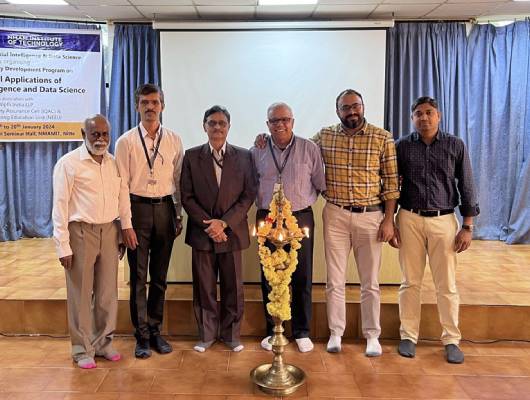
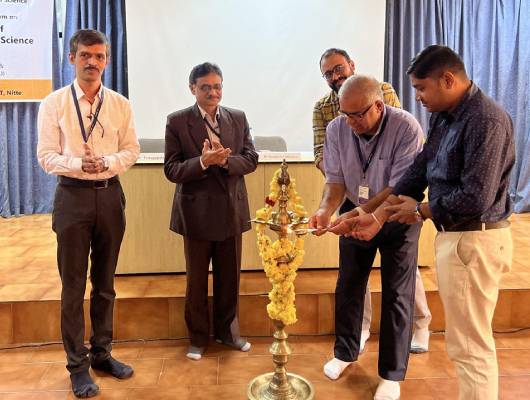
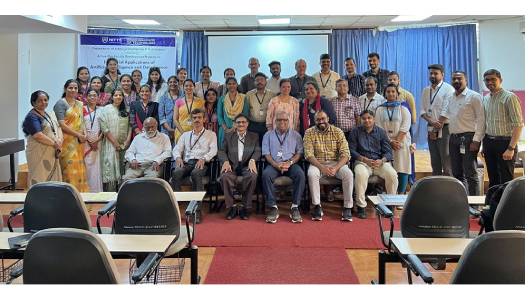
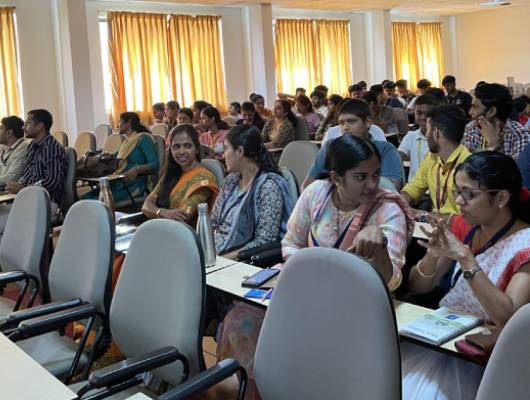
Date: 4 January 2024
Venue: ADL03
Resource Person:
- Dr. Ankitha K, Assistant Professor Gd-III, AI&DS
- Ms. Ankitha Shetty, Assistant Professor Gd-I, AI&DS
Department of AI&DS organized a half day workshop titled “Exploring Jetson Nano for Data Science” on 4th January 2024 for the faculty members of NMAMIT, Nitte. Dr. Ankitha K and Ms. Ankitha Shetty, faculty in the department of AI&DS, were the resource persons of the workshop. A total of 15 faculty from various branches participated in the workshop.
Ms Ankitha Shetty provided insights into Edge AI, Jetson Deep Dive-Platform, Family and Hardware, Initial setup and first boot and TAO toolkit. Dr. Ankitha K discussed TensorRT, Deepstream, Video AI with DeepStream on Jetson, NVIDIA SDKs for Audio and Robotics Application development and Generative AI on Jetson. Few applications developed to run on Jetson Nano were demonstrated. The significance of using the board for developing video processing applications was discussed. Participants were asked to motivate the students to attend the NVIDIA Global Technology Conference to be held from 17- 21 March 2024, in online mode and work on the projects related to NVIDIA boards. These works could lead to quality publications.
Participants were also given insights of NVIDIA Jetson AI Courses and certification. The session concluded with the remarks and thanking note by the HoD, Dr. Venugopala P. S.
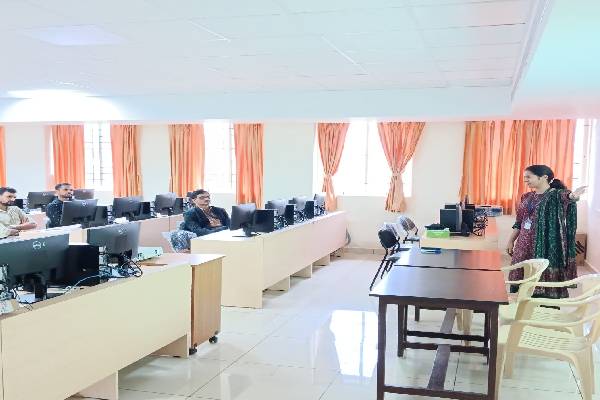
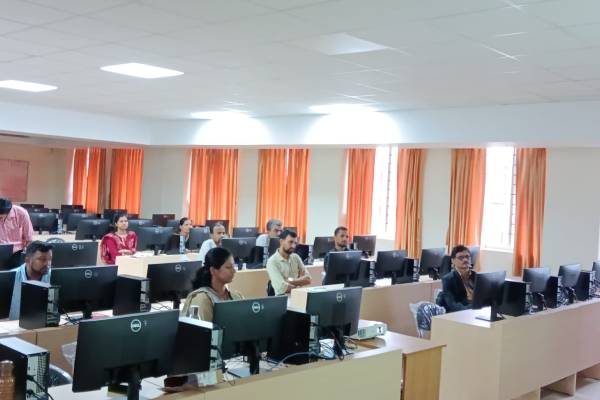
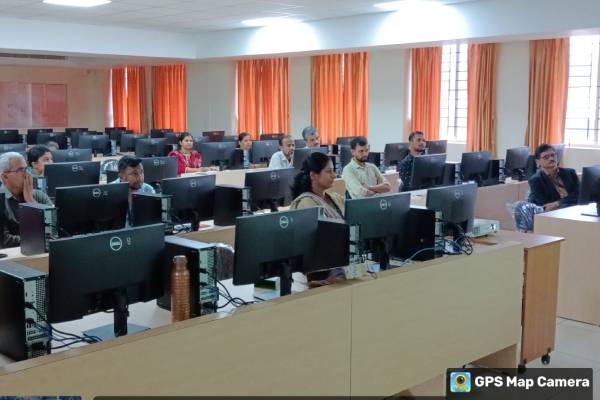
A Five-day faculty development program on ‘Data Science - Industry & Academia Perspective’ was organized by the Dept. of Artificial Intelligence & Data Science in association with the Internal Quality Assurance Cell (IQAC) & Nitte Engineering Education Unit (NEEU) from 13 to 17 March 2023. The FDP was inaugurated by Mr. Murali Iyer, Former Partner, Wipfli USA. In his inaugural address, Mr. Murali highlighted the importance of data and the need to analyse the data from the industrial perspective; he emphasized the importance of learning data science as an engineering curriculum. He enlightened the participants with his knowledge of working on projects related to data science and data analytics. He said that data science, artificial intelligence, and machine learning are to be taught to the students with the help of real-time examples.
Guest of Honour Mr. Sumanth Padival, Director & Head of India Operations Bengaluru, during his address, highlighted the need for real-time projects to understand the fundamental concepts. Mr. Sumanth also coordinated the team from Wifli to be the resource persons for this 5-day faculty development program.
Dr. Niranjan N Chiplunkar, Principal, NMAMIT, in his presedential remarks, highlighted the need of industry-academia collaboration in the engineering curriculum. He also emphasised that the faculty must be trained in handling subjects that are in line with industry requirements.
Dr. Venugopala P S, Head, Department of Artificial Intelligence and Data Science welcomed the gathering and presented an overview of the 5-day FDP. Mr. Prajwal Hegde introduced the guests. Ms. Ankita Shetty proposed the vote of thanks.
It may be recalled that NMAM Institute of Technology started a B.Tech program in Artificial Intelligence and Data Science under Nitte (Deemed to be University) from the Academic Year 2022-23. The Institute has academic collaboration with Wipfli India for curriculum development, internships, and placements. The FDP was organised with technical assistance from Wipfli India.
Topics like, Industrial implications of Data Science-Expectations from fresh graduates; R programming for data handling; Customer needs and development process of a DS project by applying engineering fundamentals; Data sources, Data Cleaning, Data modelling, and BI; Demo of an open-source tool for data cleaning and pre-processing; Components of a DS project, roles involved, knowledge expected, and the process followed; Web scraping and UI development; Applications of ML algorithms in real-time projects (Case studies); Data analytics with Excel / UI design; Statistics in application to DS; Python for Data Science- data pre-processing, and visualization libraries were covered during this five day FDP.
The events during the five days of the workshop are as follows -
Day 1
Mr. Murali Iyer, Former partner, Wipfli India, conducted a session on “Industrial implications of Data Science, Expectations from fresh graduates” providing an overview of data science in industry, benefits and challenges of using data science, skills and knowledge required to succeed in data science.
The second session was on “R programming for data handling - hands-on” by Dr. Anisha P R withhands-on exercises for data handling using R.
Day 2
The first session was conducted by Mr. Murali Iyer on “Customer needs and development process of a DS project by applying engineering fundamentals” where an overview of engineering fundamentals in data science, customer needs and requirements for a data science project, and development process for a data science project was discussed.
The next session was handled by Dr. Venugopala P S, on “Data sources, data cleaning, data modeling, and BI”addressing data sources for data science projects, Data cleaning, and pre-processing techniques, and Data modelling techniques.
Mr. Pranesh (Wipfli India), gave a Demo of an open-source tool for data cleaning and preprocessing in the last session.
Day 3
Mr. Santosh Shet & Mr.Praveen Subu (Wipfli India) delivered a detailed session on “Components of a DS project, roles involved, knowledge expected, and the process followed” facilitating the participants to understand the components, Roles and responsibilities of team members, Skills and knowledge expected from team members and Process followed for a data science project.
In the afternoon session Mr. Nabarun Chakravarthy & Mr. Chethan Pagaria (Wipfli India) given an overview on “Web scraping and UI development.”
Day 4
The first session on “ Applications of ML algorithms in real-time projects (Case studies)” Was handled by Mr. Santosh Shet & Mr.Praveen Subu (Wipfli India) with Case studies on real-time projects using machine learning algorithms.
In the second half Mr.Pranesh (Wipfli India), conducted a hands-on session on Data analytics with Excel / UI design.
Day 5
Mr. Shailesh M. S. , Encora Innovation Labs, deliverd a detailed presentation on how statistical concepts are used and applied in data science along with Hands-on exercises for data pre-processing and visualization using Python.


An interaction program with Mr. Murali Iyer, Former Partner, Wipfli USAwas organized for the students of the Department of AI & DS on 15th March 2023 from 1 pm to 2 pm at Shambhavi Seminar Hall.
During the interaction program, Mr. Murali highlighted the importance of data in the present-day world and the need to analyze the data from the industrial and business perspective; The data comes in various forms and from various sources, and he emphasized the importance of learning data science as an engineering curriculum in order to understand the process of handling the data. He enlightened the students with his knowledge of working on projects related to data science and data analytics. He believed data science, artificial intelligence, and machine learning are to be explored with the help of real-time examples. He informed the students to take up internships and work on real-time projects. He highlighted the importance of communication while working oncustomer-centered projects. Students are advised to develop communication skills during their course of study in college. The institutions will provide an ample number of opportunities to work as a team during projects and co-curricular activities. These activities are to be used to build leadership and communication skills. Technical competitions and hackathons are to be used as a platform to learn coding and project-building skills. Mr. Muraliinformed the students that a skilled person will always be in demand in the industry. Hence the students need to work for improving their technical and inter personals skills during the study of their engineering course. Students clarified their questions about the future of data science and possible career opportunities. Mr. Murali has explained the idea of career paths for the students. 65 students from the second semester of the AI&DS branch participated in the program.


Association Activities
Date: 28 October 2023
Venue: ADL03, 6th Floor, SMV block, NMAMIT
IDEA, the students’ association of the department of Artificial Intelligence and Data Science successfully organized a comprehensive hands-on workshop titled "EXPLORING DATA INSIGHTS USING EXCEL AND TABLEAU" on the 28 October 2023. The workshop was sponsored by the IEEE student branch of NMAMIT, Nitte. Dr. Venugopala P S, HoD of AI&DS department and Ms. Ankitha Shetty, faculty in the department of AI&DS, were the resource persons for the workshop aimed to delve into the fundamental aspects of Excel and the transformative power of Tableau in data analysis and visualization. Total 45 students from various branches participated in the workshop.
Sessions:
The workshop spanned from 9.30 am to 4.30 pm was divided into two key sessions:
- Excel Fundamentals by Ms. Ankitha Shetty: The session elucidated the basics of Excel, providing participants with a solid understanding of the essential functionalities and capabilities within the platform.
- Tableau Demonstration by Dr. Venugopala P. S.: This session showcased the prowess of Tableau, demonstrating how to understand the data, transform raw data into visually compelling dashboards and stories by creating various types of graphs, illustrating the potential for insightful data interpretation.
Engagement Activities:
The event also featured interactive segments such as a quiz and a Tableau dashboard contest. These activities had not only engaged the participants but also encouraged healthy competition among them, motivating everyone to showcase their skills and creativity. Winners of these contests were duly recognized and rewarded for their exceptional performance.
Outcomes and Impact:
The workshop significantly contributed to enhancing the technical skills of the participants in both Excel and Tableau. Moreover, it served as a catalyst to inspire creativity in capturing the data, analyzing and creating visualization as per the customer need. The engagement and knowledge shared marked a significant milestone in the journey of the participants, leaving a lasting impact on their professional growth and skill development.
Conclusion:
The "EXPLORING DATA INSIGHTS USING EXCEL AND TABLEAU" workshop conducted in collaboration with IEEE, was a resounding success, fostering an environment of learning, competition, and camaraderie. The dedication and expertise of Dr. Venugopala P. S. and Ms. Ankitha Shetty, combined with the enthusiasm of the participants, made this workshop a pivotal moment in the department's calendar.
The workshop was well organized by the technical team of the students’ association with good support from the media and publicity team and other office bearers.
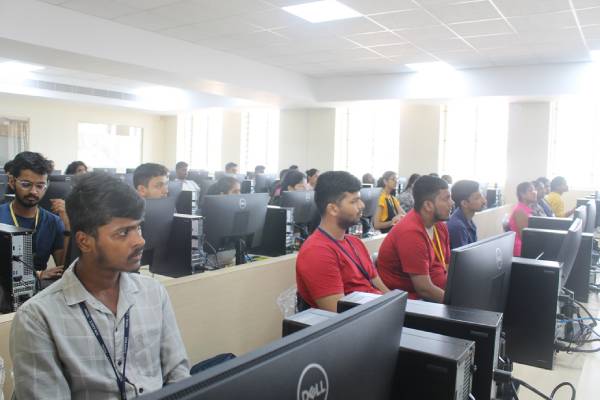
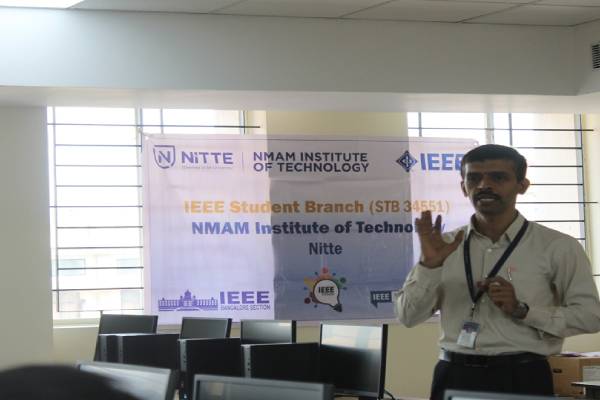
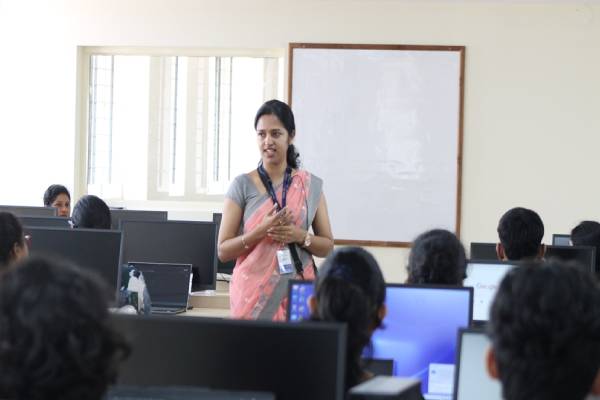
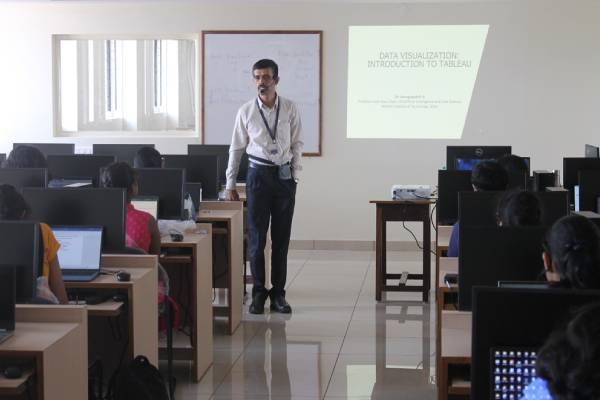
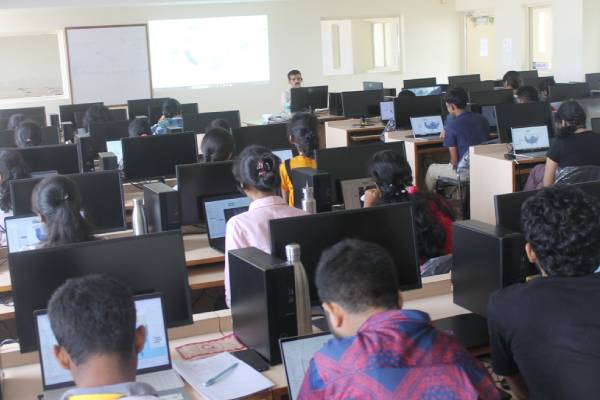
Apni Diwali was a cultural event organized by the IDEA student association of the Department of Artificial Intelligence and Data Science. This event invited participants to share the warmth and traditions of their Diwali celebrations by posting videos from the heart of their homes. The event provided a captivating glimpse into the diverse ways our students observe this festival, creating a virtual mosaic of cultural richness and encouraging students to share their unique Diwali celebrations through videos, creating a virtual tapestry of diverse traditions.
Participants are instructed to create a 30-second video of their home Diwali celebration and upload the same in a Google form link shared by the organizing team. The diversity and creativity witnessed in the submissions were truly inspiring. These videos were posted on the Instagram page of Artificial Intelligence and Data Science for 13 days for the judging process.
According to the rules, first place is awarded in two categories: "Best Video" and "Highest Liked Video." The judging criteria for the best video include visual appeal, videography, editing, and creativity. Two winners have been selected. The first winner was determined by the highest number of likes their post received, while the second winner was chosen based on the thoughtful evaluations of our faculty judges. Both winners receive attractive cash prizes.
Apni Diwali" served as a platform for students to express their cultural identity, fostering a sense of belonging and shared celebration. From traditional rituals to modern adaptations, every entry contributed to the rich tapestry of Diwali celebrations within our college community.
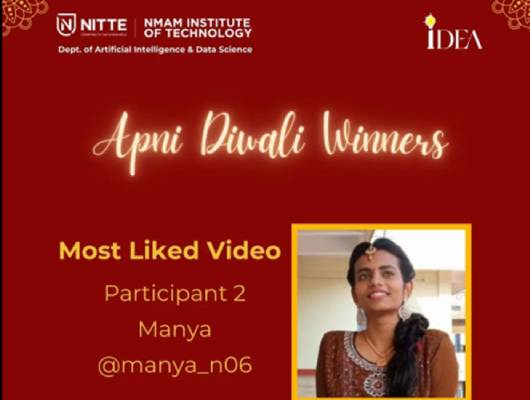

Department of AI&DS organized an interaction session on preparation towards successful placement for the benefit of III semester students. The LINKUP event unfolded as a focused online session, offering invaluable insights into kick starting placement preparations and crafting a holistic plan for personal development. The session featured Rashmi Murali, a 2023 Batch CSE graduate and Management Trainee at ACT Fibernet, as the resource person. Ms. Rashmi covered crucial topics such as resume building, interview preparation, and strategies for personal growth. 50 students of have registered for the talk and raised queries regarding placement preparation from starting from the second year of engineering. Ms. Rashmi provided clear idea about various coding sites to register and take up coding problems to improve programming skills. She highlighted the need of working on internships by taking real world problem. She said that working on research projects and writing research papers act as added benefits. Leadership skills, effective communication and team work are the skill sets that students can develop by participating in extra curricular activities in the college. She discussed these aspects along with narrating her experiences during the college days. Students actively participated in the event by clarifying their doubts about the topics related to placement process and the preparations required for the same.
The session coordinated by Ms. Ankitha Shetty, faculty coordinator of IDEA in association with Institution Innovation Council, NMAMIT, Nitte, was concluded with remarks and words of gratitude by the HoD, Dr. Venugopala P. S.
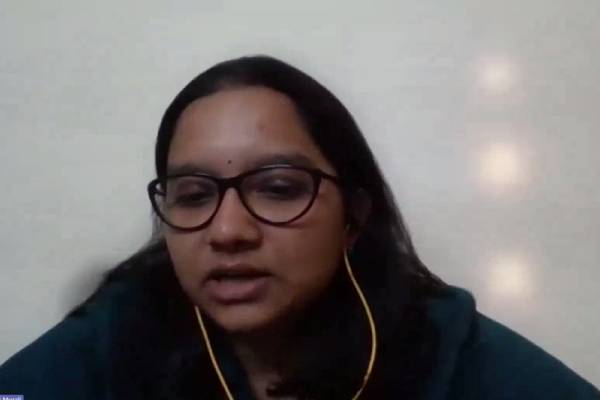
Software Engineering is a core subject for all the IT related branches. The subject addresses the practice being followed in all IT industries for software development. Students are expected to inculcate this practice during their engineering course. To make a practical attempt to implement the practices of software engineering for the mini projects of 4th semester course and the projects in higher semester, the department has conducted the hands-on workshop titled “Hands on experience with software engineering”. The workshop was facilitated by the resource persons from Wipfli. All 72 students of the AI&DS branch have participated in this two-day workshop.
Mr. Balasubramanian Chidambaram and Ms. Radha K from Wipfli Bangalore handled the sessions. The session aimed to provide participants with practical skills and knowledge related to the field of software engineering and to equip them with confidence to excel in software engineering roles and contribute effectively to software development projects. The workshop began with an overview of what software engineering is, its importance in modern days, its various components, and methodologies.
Mr. Balasubramanian provided a comprehensive overview of Agile methodologies, including Scrum, Kanban, and their respective ceremonies. He elucidated the intricacies of various Scrum ceremonies, distinguishing them from one another and clarifying their roles within the Agile framework. Moreover, he delineated the disparities between Scrum and Kanban, shedding light on their distinct approaches to project management. Through insightful discourse, he elucidated how industries initiate and progress projects using Agile methodologies.
Ms. Radha delved into the practical aspects of Agile implementation, focusing on key elements such as the daily Scrum, user story writing, and sprint planning. She provided detailed explanations of these essential components, emphasizing their significance in facilitating effective Agile project execution. With her expertise, she elucidated the intricacies of sprint cycles and the importance of meticulous sprint planning in achieving project objectives. Through her informative presentation, participants gained valuable insights into the practical application of Agile principles in real-world scenarios. All these aspects were demonstrated through roles plays.
Participants learnt about the various stages of the software development life cycle, including requirements gathering, design, implementation, testing, deployment, and maintenance. Participants would be introduced to popular tools and technologies used in software engineering, such as integrated development environments, version control systems, project management tools, and collaboration platforms.
Throughout the workshop, instructors have presented case studies and real-world examples to illustrate key concepts and best practices in software engineering. The event was coordinated by Ms. Ankitha Shetty and supported by Mr. Prajwal Hegde
The workshop received good feedback from the students. The resource persons were presented with the paintings drawn by Ms. Abhijna and Ms. Nidhi Shenoy as mementos.
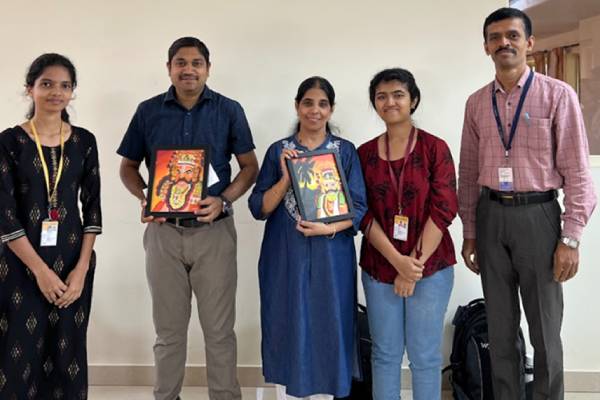

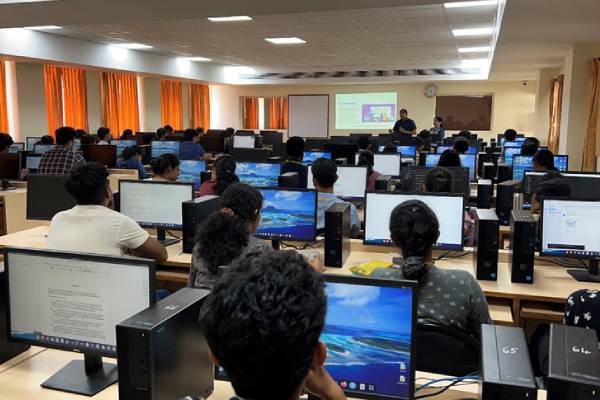

Dr. Ankitha K, Assistant Professor, Dept of AI&DS, conducted a detailed session aimed at guiding 4th-semester students on the intricacies of writing research papers. The session covered various aspects ranging from selecting a suitable title to crafting comprehensive conclusions.
Dr. Ankitha emphasized the importance of selecting a clear, concise, and relevant title that accurately reflects the content of the research paper. The session delved into the significance of abstracts in providing a concise summary of the research paper. She has discussed best practices for writing abstracts, including outlining the research problem, methodology, key findings, and implications. She provided guidance on structuring the introduction by including background information, research objectives, and the significance of the study. She also discussed strategies for identifying relevant literature, synthesizing key findings, and identifying research gaps.
Dr. Ankitha provided insights into effectively describing the research methodology, including research design, data collection methods, and data analysis techniques. She emphasized the importance of clarity and transparency in describing the research process to ensure reproducibility. The session covered strategies for presenting research findings effectively, including the use of tables, figures, and descriptive statistics. Dr. Ankitha discussed the importance of interpreting results in the context of research objectives and addressing any unexpected findings. Dr. Ankitha concluded the session by discussing the key components of a research paper conclusion, including summarizing key findings, discussing implications, and suggesting areas for future research. She underscored the significance of providing closure to the research paper while leaving a lasting impact on the reader.
Dr. Ankitha's session provided students with valuable insights into the intricacies of research paper writing, covering essential aspects from title selection to conclusion writing. Her expertise and guidance are invaluable resources for students embarking on their research journey, equipping them with the necessary skills to produce high-quality research papers.
The event was coordinated by Dr. Venugopala P S.
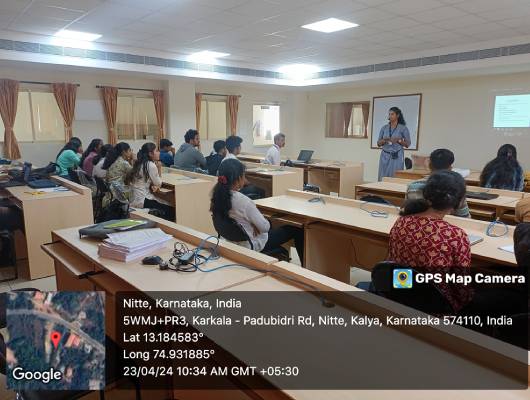
The Incredia 2024 was held from 22 to 24 February 2024. IDEA Student Association of the Department of AI&DS conducted an event called Animverse, a fun-filled event for the Anime geeks. The event had a few rules and regulations such as: A team must consist of 3 members, All the participants must be from the same college, Participants must present a physical college ID card to participate in the event and the decisions of the judges and organizers will be final. Approximately 42 students participated in the event, forming groups of three.
The event had two rounds. The first round was a quiz round. There were 30 questions and 30 minutes were given for the same. The quiz had statements and image-based questions. There were a few tiebreaker questions to resolve ties between the teams. At the end of the first round,10 teams were selected for the next round.
The second round was Anime Games, which consisted of five different games: Pictionary, Guess by Intro, Guess by Catchphrase, Guess by English Name, and Guess by Voice. In the Pictionary game, one member from each team had 40 seconds to draw on the board (30 seconds plus an additional 10 seconds). A warning bell rang after the first 30 seconds, giving the remaining team members 10 extra seconds to guess the character for the point to be awarded. For the other four games, a digital buzzer was used. The rules were as follows: the first team to press the buzzer had 6 seconds to answer. A correct answer earned 20 points, while an incorrect answer resulted in a deduction of 10 points. If the first team answered incorrectly, the next team that buzzed in would get a chance to respond, with 10 points awarded for a correct answer and a deduction of 5 points for an incorrect one.
The event lasted for a total of 2 hours, with 10 teams achieving the highest scores and advancing to the next round. In the event of a tie, the time of quiz form submission was used as a tiebreaker. The team with the highest score was declared the winner. The event was successfully conducted by a well-organized committee led by Ms. Abhijna N and Ms. Rashmi N, the cultural coordinator of the student association IDEA.

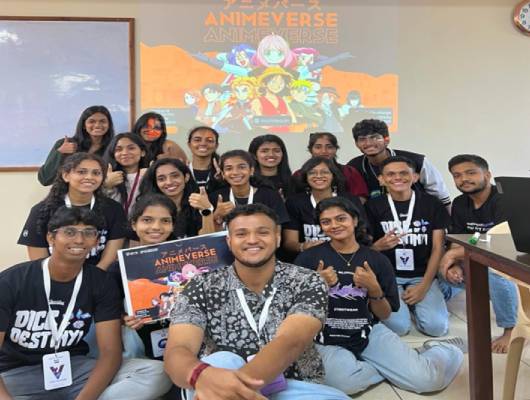
The annual sports meet of NMAMIT was held on 31 January 2024, at the BC Alva Sports Complex of Nitte. This was a grand affair filled with enthusiasm and spirited competition. Among the various events that took place, one of the highlights was the march past, which saw active participation from students of all the branches including AI&DS. Under the able leadership of Mr. Swasthik Devadiga and Ms. Rhea Rodrigues, sports coordinators of the student association IDEA, all students dedicatedly practiced the march past routine for an entire week leading up to the event.
Their hard work and commitment bore fruit as they not only participated but also emerged victorious, winning the first place in the march past competition. In addition to the disciplined march past, what set their performance apart was their innovative incorporation of the TULUNADU theme, which added a unique cultural flair to their routine, garnering praise and admiration from the audience and judges alike. The aspect that particularly stood out was the seamless coordination displayed by the students during the march past. The success of the AI&DS students in the march past event not only highlighted their athletic prowess but also showcased their creativity, dedication, and teamwork, making them shining examples of the spirit of sportsmanship and excellence at NMAMIT.
